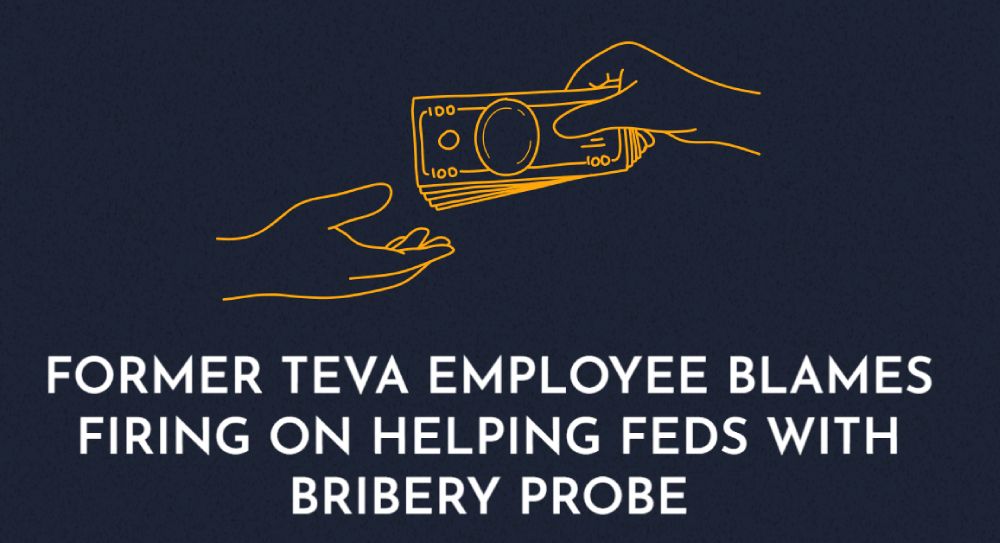
Earlier this year, Teva Pharmaceutical disclosed an internal investigation found business practices that were “likely” violations of the Foreign Corrupt Practices Act. The drug maker began its probe after receiving subpoenas and other requests for information related to foreign bribery from the U.S. Securities and Exchange Commission and the U.S. Department of Justice Department in 2012 (see page 6).
The run-up to that revelation, however, was allegedly fraught with internal bickering over procedures for pursuing violations, according to a lawsuit filed by a former Teva employee. Moreover, Keisha Hall, a one-time Teva certified fraud examiner and director of finance for Latin America, claims she was eventually fired for disagreeing with supervisors and helping U.S. officials with their investigation.
Teva is only the latest drug maker to become immersed in FCPA issues. U.S. officials are actively scrutinizing the pharmaceutical industry. Meanwhile, GlaxoSmithKline, Sanofi and the Alcon eye unit at Novartis, for instance, have been running internal investigations into potential problems in various countries. Four years ago, Johnson & Johnson paid $70 million to resolve FCPA violations.
As for the allegations made by Hall, her lawsuit claims that, from the time she arrived at Teva in 2008, she became aware the Latin America region had a history of events related to corruption. For instance, she claims she learned of investigations conducted by outside counsel earlier that year who identified numerous FCPA violations, according to the lawsuit, which was filed in federal court in Florida this week.
These included unauthorized payments to doctors in Chile and bribing doctors working for government hospitals, according to the lawsuit. She also alleged various investigations related to FCPA violations had been conducted between 2007 and 2010 by third parties, each of which resulted in findings and remediation recommendations.
Specifically, Hall was assigned to develop forms for tracking sales and marketing activities, and to develop a portal for automatically recording data, according to the lawsuit. However, Hall claims in her lawsuit that she later ran into roadblocks after some Teva managers allegedly sought to alter procedures for gathering information that is supposed to be collected to ensure compliance with the law.
After Hall began reporting to a different manager, she was told “the role of compliance was not to interfere with the business-related needs of the company,” according to the lawsuit. And her new manager was “not too concerned with the FCPA” because violations would “only result in fines,” the lawsuit states, adding that many monitoring controls and compliance mechanisms were dismantled.
As a result, the level of monitoring in Latin America, notably Argentina, declined and managers ignored reports of the fraudulent payments to the Mexican government, according to the lawsuit. But despite making suggestions to maintain certain practices, she and her supervisor were eventually overruled, the lawsuit alleges.
By 2013, shortly after Teva began an internal probe, the lawsuit states Hall was asked to provide testimony to investigators for the SEC and Justice Department that covered events dating back a few years. These included internal disagreements over memos outlining deficiencies in complying with the Sorbanes-Oxley Act, which regulates corporate governance and financial practices.
Last year, Hall took a maternity leave and applied for a promotion, but instead, was told an anonymous whistleblower alleged she had inappropriately used Teva equipment – notably, a laptop – for personal use, according to the lawsuit. She was fired last November. Teva also claimed Hall was terminate dfor “instigating conflict, but alleged no misconduct associated with work,” the lawsuit says.
A Teva spokeswoman writes us that the allegations are “entirely false” and that Hall was fired for violating company policy. The lawsuit, for instance, recounts how Hall was told she inappropriately used Teva equipment for personal business. The drug maker will “vigorously defend the allegations,” the spokeswoman writes.
This article was first published on the WallStreetJournal in 2015.

